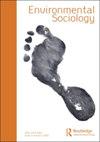我们的空气有多公平?印度德里空气污染话语中的程序、分配和承认的不公正
IF 2.8
Q3 ENVIRONMENTAL STUDIES
引用次数: 1
摘要
摘要空气污染的风险状况为不同的利益相关者带来了正义的多重含义。我们研究了2017年至2020年间发表的两家印度报纸的535篇文章,获得了与德里环境空气污染有关的13个司法概念。运用环境正义的理论视角,我们观察到非政府组织和学术机构主导参与的程序正义和分配正义话语的盛行。承认正义是所有话语中代表性最差的。我们使用话语网络分析来揭示印度公民、印度最高法院和农民在司法辩论中的突出地位,以及政府机构的总体参与受到限制。我们的研究结果突显了学术和非学术行为者在空气污染的过度影响方面的两极分化。对于德里的空气污染缓解,我们建议不同的利益相关者有组织、包容地参与决策,承认人口之间的社会文化差异。本文章由计算机程序翻译,如有差异,请以英文原文为准。
How fair is our air? The injustice of procedure, distribution, and recognition within the discourse of air pollution in Delhi, India
ABSTRACT The risk profile of air pollution generates multiple meanings of justice for diverse stakeholders. We examined 535 articles from two Indian newspapers published between 2017 and 2020 and obtained 13 concepts of justice pertinent to ambient air pollution in Delhi. Employing the theoretical perspective of environmental justice, we observed the prevalence of procedural and distributive justice discourses with dominant participation from non-governmental organizations and academic institutions. Recognition justice emerged the most underrepresented of all discourses. We used Discourse Network Analysis to reveal the prominence of Indian citizens, the Supreme Court of India, and farmers in the justice debate, and an overall restricted participation of the government bodies. Our findings highlight polarization among the academic and the non-academic actors on the disproportionate effect of air pollution. For air pollution mitigation in Delhi, we suggest organized and inclusive participation by diverse stakeholders in decision-making, acknowledging socio-cultural differences among populations.
求助全文
通过发布文献求助,成功后即可免费获取论文全文。
去求助
来源期刊

Environmental Sociology
ENVIRONMENTAL STUDIES-
CiteScore
4.60
自引率
12.00%
发文量
34
期刊介绍:
Environmental Sociology is dedicated to applying and advancing the sociological imagination in relation to a wide variety of environmental challenges, controversies and issues, at every level from the global to local, from ‘world culture’ to diverse local perspectives. As an international, peer-reviewed scholarly journal, Environmental Sociology aims to stretch the conceptual and theoretical boundaries of both environmental and mainstream sociology, to highlight the relevance of sociological research for environmental policy and management, to disseminate the results of sociological research, and to engage in productive dialogue and debate with other disciplines in the social, natural and ecological sciences. Contributions may utilize a variety of theoretical orientations including, but not restricted to: critical theory, cultural sociology, ecofeminism, ecological modernization, environmental justice, organizational sociology, political ecology, political economy, post-colonial studies, risk theory, social psychology, science and technology studies, globalization, world-systems analysis, and so on. Cross- and transdisciplinary contributions are welcome where they demonstrate a novel attempt to understand social-ecological relationships in a manner that engages with the core concerns of sociology in social relationships, institutions, practices and processes. All methodological approaches in the environmental social sciences – qualitative, quantitative, integrative, spatial, policy analysis, etc. – are welcomed. Environmental Sociology welcomes high-quality submissions from scholars around the world.
 求助内容:
求助内容: 应助结果提醒方式:
应助结果提醒方式:


